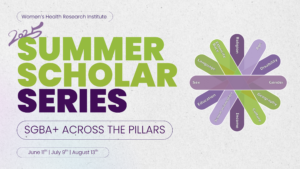
Sex and Gender-Based Analysis Plus (SGBA+) Across the Pillars
From June to August 2025, the Women’s Health Research Institute was proud to host the third season of the Summer Scholar Series. This year’s theme, Sex- and Gender-Based Analysis Plus (SGBA+) Across the Pillars, highlighted the vital role SGBA+ plays in advancing more equitable, inclusive and effective women’s health research and clinical practices.
The Summer Scholar Series continues to serve as a valuable space for WHRI members, trainees, and staff to connect, share insights, and explore key considerations that shape every stream of women’s health research.
Our engaging lineup of speakers included: Dr. Julian Christians, Dr. Rachel Ollivier, and Patricia Barkaskas.
SGBA+ is a critical tool in women’s health research as it promotes ethical and inclusive health outcomes. By examining how sex and gender—along with other intersecting identity factors such as race, disability, income, Indigeneity, culture and geography—shape people’s health expertise, SGBA+ supports researchers to design more equitable and responsive health systems or approaches.
Women, trans, non-binary, Two-Spirit, gender non-conforming, and gender-diverse individuals often face unique health risks and systemic barriers to accessing care—particularly in areas such as sexual and reproductive health, mental health services, and gender-affirming care like hormone therapy.
To address these disparities, research must be gender-inclusive and intentionally designed to reflect the needs of everyone. SGBA+ is not just a research framework—it’s a commitment to health equity.
Implementing SGBA+ in women’s health research enables a more responsive and equitable health care system by recognizing how intersecting factors—such as gender, race, and income—shape individual experiences. This inclusive approach not only improves research quality but also informs policies, programs, and services that better meet the needs of the entire public.
Dr. Julian Christians opened his presentation by affirming that sex and gender are essential considerations in health research, but acknowledged the limitations of binary categories. In cases where physiological processes are heavily influenced by gonadal hormones, he suggested that analyzing hormone levels may offer more meaningful insights than relying solely on male and female classifications.
Key Takeaway: SGBA+ in basic science requires more than including sex as a variable— and a commitment to avoiding oversimplified or binary assumptions—especially when claims of sex differences may not be biologically or clinically meaningful.
Dr. Rachel Ollivier discussed the growing impact of cardiovascular disease (CVD) on women’s health, highlighting that it is now the leading cause of premature death for women worldwide. Since 2015, both Canada and the United States have reported an increase in CVD-related deaths among women. Despite this, women continue to be understudied, underdiagnosed, undertreated, and underrepresented in cardiovascular research.
Key Takeaway: To reduce disparities in cardiovascular outcomes, health professionals must integrate sex- and gender-specific approaches into research, diagnosis, and care—ensuring that no patient is overlooked.
Patricia Barkaskas presentation focused on the IGBA+ Toolkit, which is designed to help government employees and corporate professionals understand the socio-cultural and historical realities shaped by colonization and systemic racism.
Barkaskas highlighted that the toolkit serves as a call to action to intentionally include Indigenous voces, knowledge and lived experiences into decision making processes.
Key Takeaway: The IGBA+ Toolkit emphasizes the importance centering, valuing and restoring the voices of Indigenous communities—including Indigenous women, Two-Spirit and gender-diverse individuals—within decision making, project development, governance, policies, and practices across all industries.
Thank you to Dr. Julian Christians, Dr. Rachel Ollivier, and Patricia Barkaskas for their valuable contributions to this year’s Summer Scholar Series.
We look forward to seeing you in 2026!
- If you weren’t able to attend, please check out the recordings on our YouTube channel.
- Follow WHRI on social media to stay up to date with all events and learning opportunities.